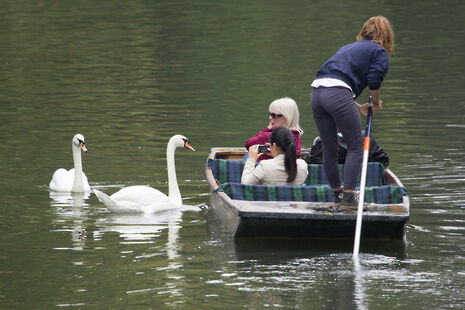Proposals to cull swan eggs to manage numbers
New proposals to cull swan eggs in order to control numbers and protect punters are now being considered

Plans to kill unborn baby swans in order to control bird numbers and protect punters on the River Cam are under consideration.
The Cam Conservators, the organisation responsible for the management of the River Cam, have developed the proposals after moving swans’ nests to other locations failed to adequately control numbers.
This measure followed several aggressive encounters between punters and the Cam’s swan population.
One swan, dubbed ‘Mr Asbo’, had to be moved to a secret location 60 miles away from Cambridge in 2012 following repeated reports of violence against punters.
In 2014 his son, named ‘Asboy’, appeared to take after his father as he launched a campaign of terror against punters. This year, a young swan nicknamed ‘Asbaby’ was seen chasing boats and devouring punters’ sandwiches during the Easter Bank Holiday.
However, Natural England (NE) have raised concerns about the plans, arguing that the measures have “significant welfare implications”.
Now Natural England have argued that ‘pricking’ or ‘egg oiling’ as means of killing swan embryos are more humane solutions to the problem of the burgeoning swan population.
NE experts advocate coating the eggs in liquid paraffin, a substance which is harmless to fully grown swans but which blocks the pores of the egg shell and starves the embryo of oxygen. The NE website states the technique is “easy to carry out, 100 per cent effective in preventing hatching and does not adversely affect the sitting bird”.
An alternative method is egg pricking, which has been suggested by government officials who have visited the river. It involves piercing the egg with a pin and moving it around inside the egg rapidly in order to kill the embryo before returning the egg to the nest.
However egg pricking is a riskier strategy than oiling, as the mother is more likely to notice that the eggs are damaged, and may desert the nest and lay another clutch.
Jed Ramsay, River Manager for the Cam Conservators, highlighted the issue of swan violence in a report after meetings with officials from the Cambridge Rowing Association, the Cambridge University Boat Club and Natural England officials.
Earlier this week, Mr Ramsay described how “[k]eeping the balance between use of the river for people and swans is quite a challenge”.
He made clear his opposition to egg oiling, adding: “I’m strongly against oiling swans’ eggs, and I will be working to come up with a better solution”.
John Torlesse, NE’s manager for Cambridgeshire, commented: “We have advised the Cam Conservators and rowing clubs that the most effective way of reducing incidents between swans and rowers on race day is to temporarily corral some of the swans on the river”.
The Crown retains the right of ownership of all unmarked mute swans in certain stretches of the River Thames.
In addition, it is an offence to injure, take or kill a wild swan under the provisions of the Wildlife and Countryside Act 1981. It is now classed as criminal damage to kill any swans under royal ownership on the Thames.
 News / Fitz students face ‘massive invasion of privacy’ over messy rooms23 April 2024
News / Fitz students face ‘massive invasion of privacy’ over messy rooms23 April 2024 News / Cambridge University disables comments following Passover post backlash 24 April 2024
News / Cambridge University disables comments following Passover post backlash 24 April 2024 Comment / Gown vs town? Local investment plans must remember Cambridge is not just a university24 April 2024
Comment / Gown vs town? Local investment plans must remember Cambridge is not just a university24 April 2024 Comment / Does Lucy Cavendish need a billionaire bailout?22 April 2024
Comment / Does Lucy Cavendish need a billionaire bailout?22 April 2024 Interviews / Gender Agenda on building feminist solidarity in Cambridge24 April 2024
Interviews / Gender Agenda on building feminist solidarity in Cambridge24 April 2024






